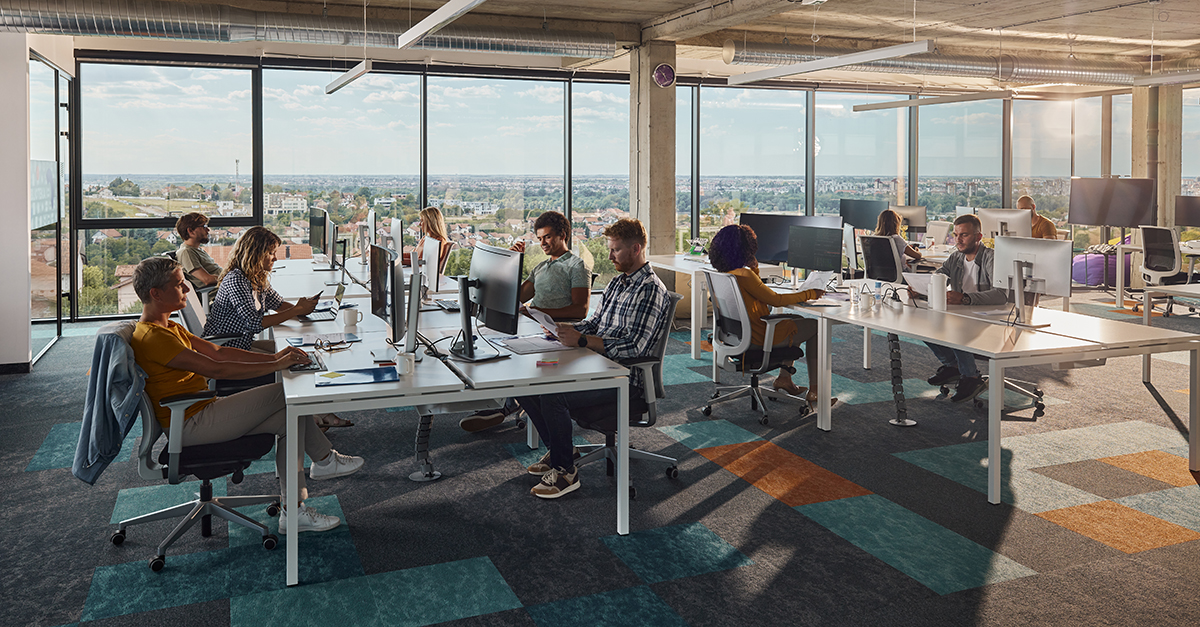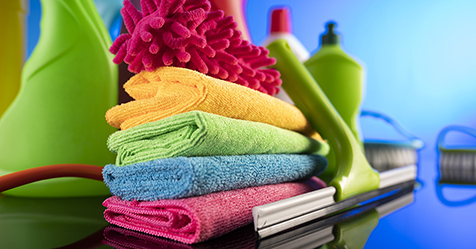The days of office employees working five days a week at designated desks and conducting all meetings in conference rooms are probably gone forever. But that doesn’t mean companies don’t recognize the need to occasionally ditch online meetings and bring employees together a few times a week. As many companies no longer own large office suites or buildings, smaller rental office spaces, complete with meeting rooms, have become a popular option.
While the COVID-19 pandemic has ended, a heightened consciousness about cleanliness and health has remained. That means maintaining the top-notch condition of an office space—whether
that space is owned or rented—is essential.
There’s more to maintaining an office space than emptying the trash cans and turning out the lights when employees go home for the evening. For instance, carpet care and odor control
contribute significantly to a clean, pleasant workspace. Along with the legal maintenance responsibilities landlords have under the landlord-tenant law, tenants can undertake five vital office maintenance tasks to preserve the quality of rented spaces.
1. Ensure a clean and safe environment
A clean and safe environment serves as the foundation for a well-maintained office. To achieve this, promptly dispose of garbage and uphold overall cleanliness to discourage pest
infestations. Regularly inspect the space for potential hazards such as loose cables, cluttered walkways, and blocked exits. Prioritize the care of hard floors and carpet by keeping them free from
debris and promptly addressing spills and stains.
However, maintaining cleanliness extends beyond what meets the eye; it encompasses effective odor control as well. Unpleasant smells not only disrupt employees but also leave visitors
with a negative impression of your business.
To combat odors, regularly ventilate the workspace and promptly dispose of waste to prevent lingering smells. Additionally, avoid activities that could generate strong odors, such
as cooking pungent foods in the office or using heavily scented cleaning products.
Safety measures are of equal importance: It is crucial to ensure that emergency exits are always accessible and to never tamper with carbon dioxide or smoke detectors. Always maintain
these lifesaving devices appropriately by testing and replacing batteries regularly.
2. Adhere to all building and housing codes
Adherence to building and housing codes is a mandatory part of managing rented office spaces. All states and cities have specific building codes designed to ensure the safety and well-being
of those using the premises. These regulations typically encompass various building features, from fire safety measures to plumbing and electrical systems.
Familiarize yourself with these codes to ensure compliance at all times. For instance, certain states might require emergency lighting in hallways, stairwells, or other common areas.
Ignorance or negligence in these matters can lead to hefty fines or even legal action.
Additionally, consider negotiating a compliance clause with your landlord. This clause can help clarify the shared responsibilities between you and the landlord concerning maintenance tasks
and code adherence. A good practice is to keep a checklist of all these requirements and regularly confirm that you meet them.
3. Understand your responsibilities
When entering into a rental agreement, both landlords and tenants have responsibilities regarding maintenance and repairs. These responsibilities are often outlined in the lease
agreement and play a vital role in ensuring a well-maintained and harmonious workspace.
Most rental agreements include the following responsibilities:
- Landlords are responsible for housekeeping and repairs unrelated to the tenant’s use of the space, including major structural aspects and building systems.
- Tenants are generally required to keep their rented space neat and in good order, and repair nonstructural problems they have caused.
- Tenants are prohibited from actions that result in intentional property destruction or excessive negligence, and that interfere with other tenants’ enjoyment of their rentals.
- Landlords typically handle the maintenance of major building systems, while tenants are responsible for nonstructural elements like carpeting, lighting, and fixtures.
- Although tenants can negotiate responsibilities regarding maintenance and repairs, they should consider their own capabilities, as well as any potential costs and risks, before taking on additional tasks.
- At the end of the lease’s term, landlords may inspect the property and provide a schedule of dilapidations, which outlines needed repairs.
Conducting regular inspections and practicing preventive maintenance will minimize the need for major repairs. Have a proactive approach—inspect the premises for potential issues and address them promptly. Document all maintenance work undertaken for future reference and to provide proof of your due diligence.
4. Address potential lead-based paint hazards
The walls in older buildings, particularly those built before 1978, might be covered in lead-based paint. This poses significant health risks, especially during maintenance tasks that disturb
the paint, releasing lead dust or chips. Take precautions when carrying out maintenance or repair work that could affect these areas.
If you suspect that your building might contain lead-based paint, inform your landlord and seek permission before starting any maintenance or repair work that could disturb the paint. In some
cases, you might need to hire lead-safe certified contractors to handle such tasks.
Make sure your team is trained in lead-safe practices and equipped with the appropriate personal protective equipment (PPE). In addition to your landlord, you are responsible for
maintaining a safe working environment.
5. Be respectful of the property
As a facility manager, it is your responsibility to keep the rented space in good condition. Demonstrating respect for the property and taking a proactive approach to maintenance can foster a harmonious relationship with your landlord and provide a safe, healthy, and comfortable workspace for everyone.
To uphold cleanliness, regularly dust and clean offices surfaces including the floors, promptly dispose of waste, and use mild-scented cleaning products. Prevent mold growth by promptly addressing leaks and ensuring adequate ventilation. Avoid causing damage beyond normal wear and tear by using protective mats under heavy furniture and handling office equipment with care.
Keep one step ahead
The role of a facility manager in maintaining a rented office space is both extensive and pivotal. It’s not just about fixing what’s broken or keeping the space clean—it’s about creating an environment that is conducive to productivity, health, and well-being, and gives everyone who walks through the office doors a positive impression of the facility.
While maintaining an office facility might seem like a daunting task, the key lies in being proactive, knowledgeable, and diligent. Implementing a regular inspection routine, staying informed about building codes, and fostering open communication with your landlord can go a long way in ensuring the smooth management of your rented office space.




